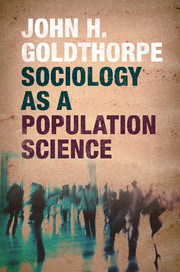Book contents
- Frontmatter
- Dedication
- Contents
- Acknowledgements
- Introduction
- 1 Sociology as a population science: the central idea
- 2 Individual variability in human social life
- 3 The individualistic paradigm
- 4 Population regularities as basic explananda
- 5 Statistics, concepts and the objects of sociological study
- 6 Statistics and methods of data collection
- 7 Statistics and methods of data analysis
- 8 The limits of statistics: causal explanation
- 9 Causal explanation through social mechanisms
- Conclusion
- References
- Index
2 - Individual variability in human social life
Published online by Cambridge University Press: 05 December 2015
- Frontmatter
- Dedication
- Contents
- Acknowledgements
- Introduction
- 1 Sociology as a population science: the central idea
- 2 Individual variability in human social life
- 3 The individualistic paradigm
- 4 Population regularities as basic explananda
- 5 Statistics, concepts and the objects of sociological study
- 6 Statistics and methods of data collection
- 7 Statistics and methods of data analysis
- 8 The limits of statistics: causal explanation
- 9 Causal explanation through social mechanisms
- Conclusion
- References
- Index
Summary
Sociology has to be understood as a population science, primarily on account of the degree of variability evident in human social life, at the level of sociocultural entities, but also, and crucially, at the individual level – this latter variability being inadequately treated within the ‘holistic’ paradigm of inquiry, for long prevalent in sociology but now increasingly called into question.
Human social life is characterised by very great variability across place and time. This can be understood as the consequence of the distinctive capacities of Homo sapiens sapiens – modern humans – for both culture and sociality. The following would, I believe, be generally accepted.
While a capacity for culture is not unique to human beings, it is in their case evolved to an exceptional degree, and primarily through their command of language, or, more generally, of symbolic communication (see e.g. Barrett, Dunbar and Lycett, 2002: chs 2, 3; Jablonka and Lamb, 2005: ch. 6). To a quite distinctive extent, humans are able to acquire, store and transmit what could be understood in a broad sense as information. That is, information about the world, material and social, in which they live, in the form of knowledge and its embodiment in skills and technologies; and also information about their own responses to this world, in the form of beliefs and values as expressed in myths, religions, rituals, customs and conventions, moral and legal codes, philosophies and ideologies, art forms and so on. But while the capacity for culture is generic, cultures themselves are particular. And across human populations, separated in place and time, the actual content of cultures and of their component subcultures has been shown to be extraordinarily diverse. Humans are far more variable than are members of all other species of animal: not, primarily, on account of greater variation in their genes or in the ecological conditions under which they live, but rather on account of the knowledge, beliefs and values that they acquire through processes of learning from others of their kind (Richerson and Boyd, 2005: 55–7; Plotkin, 2007).
Similarly, the human capacity for sociality, although not unique, is also exceptional in its degree, and in particular in its extension to non-kin.
- Type
- Chapter
- Information
- Sociology as a Population Science , pp. 17 - 31Publisher: Cambridge University PressPrint publication year: 2015



